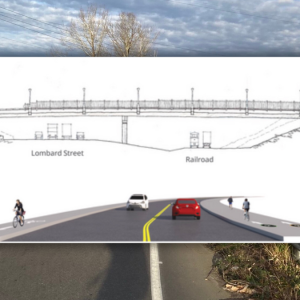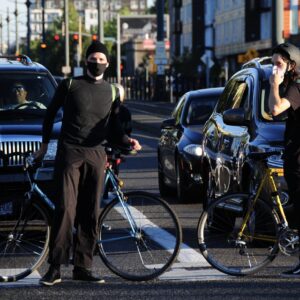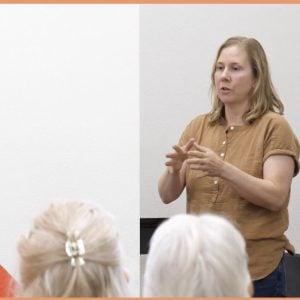Yesterday at about 4:00 pm the bicycle counter on the Hawthorne Bridge logged its 1,000,000th trip.
The counter went live on August 8th and reached 500,000 trips just three months later. Yesterday was a fitting day to break the 1 million mark as the daily total was 6,214 — the largest amount of trips since way back in October (the huge spike threw off my projections and I arrived at the bridge 629 trips too late to see number 1 million).
This $20,000 counter (which despite what you might have read was donated to PBOT) stands as an important reminder of the impact bicycling has on Portland. For the past eight months, the Hawthorne Bridge alone carried an average of 4,973 bicycle trips in and out of downtown. That’s about 2,500 vehicles entering downtown that don’t take up parking spaces, or add to the daily gridlock, or spew toxic fumes into the air, or create dangerous public spaces.
Imagine what we — as a city, as a region, as a planet full of people — gained and saved by making these 1,000,000 trips on a bicycle rather than in a car or other motorized vehicle.
Standing on the bridge yesterday, I was struck by the fact that despite this important milestone, there was no fanfare. No confetti fell from the bridge arches. The City did not call a press conference, unfurl a huge banner, or single out the 1 millionth rider for a special prize. At first I thought it was a missed opportunity. Then, as the counter flipped trip after trip after trip, I was glad. This is just business as usual in Portland. We no longer need to make a big production out of every bicycling milestone. We are on a mission to become the best bike city in the world and we have a lot of work to do.
You can delve into the counter stats here. (Note that’s not a live online display. The number is refreshed each morning at about 2:30 am.)









Thanks for reading.
BikePortland has served this community with independent community journalism since 2005. We rely on subscriptions from readers like you to survive. Your financial support is vital in keeping this valuable resource alive and well.
Please subscribe today to strengthen and expand our work.
Awesome. Is there anywhere that we can see the auto trip count for each bridge? I’m curious about how the numbers compare.
Here you go… http://www.portlandmaps.com/detail.cfm?&site_name=SE%20MADISON%20ST%20and%20SE%20MARTIN%20LUTHER%20KING%20JR%20BLVD&resultcount=1&nofooter=no&action=Traffic
Well, that link doesn’t work, but if you play around with the traffic counts on the site it looks like about 15k cars westbound and 3-5k bikes westbound on an average weekday.
Thanks, I’d forgotten about that website.
Wow, that’s a big share for bikes. We definitely need to have a “Drive to work Day” in the summer to remind habitual drivers how nice it is to get all those cars off the road. (and how grateful they should be to cyclists 🙂
Nifty.
Fun that you (happened to?) include an electric car in that last photo. It looks like the tax-payer underwritten subsidies for buying just two or three electric cars equal the total (non subsidized) cost of this counter.
http://www.nissanusa.com/leaf-electric-car/incentives/findIncentivesByZipCode/97214
I find it ridiculous that one gets a tax break for electric and hybrid vehicles. Where’s the tax break for not owning a car?
We didn’t get a tax break when we bought our Escape Hybrid. I think the tax breaks had expired already. In a way, you do get a tax break for not buying a car. You don’t pay for it, the gas, the parking, the insurance, the maintenance, the license, the car wash, etc. More money for bikes.
“In a way, you do get a tax break for not buying a car”
Marid,
you’re confusing ‘saving money’ with ‘getting a tax break.’ They are not the same thing. A tax break is a symbolic and pecuniary gesture that is meant to encourage and reward certain kinds of behavior deemed socially or otherwise admirable.
what you call “reward” i call a government transfer payment. the truly massive tax breaks doled out largely to the middle class (and above) are no different from food stamps or TANF. tax breaks are entitlements and the recipients are moochers.
I agree the electric Leaf is interesting in the photo. To further compare non-subsidized costs, for fun, I came up with the subsidized cost of (1) New Nissan Leaf equaling (48) new bikes (ave cost) or (328) new pairs of Nikes (ave cost).
I bet we’ll get to 2 million by August 8th.
the morrison bridge bike facility could have taken a lot of pressure of hawthorne if pbot had found a way to have the bike facility continue to grand.
#missed_opportunity
off
Yeah, and don’t forget the poor integration into the street grid on the west side either. It’s not quite as convenient as the Hawthorne, but I might move some of my trips if the Hawthorne continues to be clogged.
I think it will be interesting to see in a few years how the new MAX bridge will alleviate some of the bike congestion on Hawthorne.Personally I won’t be taking Hawthorne anymore once it is done. The bridge is so busy because so many people south of it have no other option. With the MAX bridge they will.
I love the Hawthorne bridge. Seriously, it pulls at my heart strings. I ride it just about every day, westbound in the dark hours of the morning, and eastbound at about 4:30 in the afternoon. I’m filled with joy every single time I do. It’s a beautiful structure with a lovely view of the city I call home.
I won’t deny I have pondered more than once about the possibility of making the Hawthorne into two lanes of car traffic instead of four. I don’t have any hard numbers to support if that is even possible with current levels of auto traffic but on a purely selfish level I would love to see that.
From an engineering/traffic volume perspective it’s totally doable… But the biggest concern I’ve heard is that TriMet buses are too wide to use the center lane. I wonder if we could somehow get bikes on the center lane? Likely not… So if TriMet won’t budge on the size issue, than I would imagine the more likely scenario is to catapult something off the sides or widen the existing path.
Given the bike traffic growth (while auto traffic has plateaued) this is something we must start thinking about.
Interesting, and thank you for the reply.
From a safety standpoint I would prefer to have bikes in the center lanes anyway. Again, just speaking personally, when I have driven over the Hawthorne I never take the center lanes because they feel incredibly confined and I’m nervous someone with a Hummer is going to be coming at me the other direction.
But that’s me.
Easy to reconfigure the bridge so there’s a full lane for bikes each way at rush hour, just make it one-lane for motor vehicles each way, and switch the traffic flow around between morning and evening so there’s a full roadway lane for the commute-direction.
Here’s how it would work:
Morning
— westbound peds have the whole sidewalk
— westbound bikes have the whole north-side roadway
— westbound motor vehicles have the whole center roadway
— eastbound motor vehicles have the south-side roadway
— eastbound bikes and peds share south sidewalk
Evening
— westbound peds and bikes share the north sidewalk
— westbound motor vehicles have the north-side roadway
— eastbound motor vehicles have the whole center roadway
— eastbound bikes have the whole south-side roadway
— eastbound peds have the whole south-side sidewalk.
They’d need to
* put in traffic signals and maybe little gates to switch the traffic around at each end.
* add solid decking on the outside roadways (for the bikes)
* narrow the center roadway (from 20′ to 12′) on the lift span to reduce weight (to compensate for the added weight of the solid decking).
Ted Buehler
i would love to see the counter number posted on bikeportland just like on copenhagenize
What Kiel said
I wonder if the rider who was the millionth knew that they were and paused to take a photo.
Yahoo! … Now when can we get counters on the other bridges? Better yet – let’s put RFID counters and tags on the bridges, and every year that I log 200 trips I GET A TAX CREDIT FOR NOT CLOGGING DOWNTOWN WITH MY CAR!
Yeah, I’d love to see one of these on the Broadway bridge. I couldn’t believe the number of cyclists on it yesterday morning! There was about 50 of us in a big group around 8:30am heading downtown.
To put those 2500 bicycle commuters and shoppers in perspective, those bicyclists if driving into the CBD would need:
– 200 block faces of parking, or
– 5 new Smart Park parking structures, or
– 62 bus trips
I actually think this does deserve a little more fan-fare. Maybe if it were more well known how much car congestion is avoided downtown by cyclists riding in every day those people who feel we don’t make a difference would change their minds. And this is just one bridge (though most likely the busiest)! Not to mention those who ride from the west/south side. Our numbers are much bigger than 1,000,000.
I may have been close to being the 1 millionth. Jonathan’s picture of the 1,000,828 was taken at 5:26 pm. I left work at about 2:30pm. That gives 3 hours for 828 people to ride over the bridge after me. 🙂 What are my chances?
Ooh, I left work to bike home at about 4. Might I have been the millionth biker??
If I had Flash installed, I would have been on it! More fanfare, please.
“Imagine what we — as a city, as a region, as a planet full of people — gained and saved by making these 1,000,000 trips on a bicycle rather than in a car or other motorized vehicle. ”
While I am in full agreement that bikes win points in all contests with cars, it really isn’t quite accurate to claim credit for reductions in that many car trips, because many of us would not/did not drive before.
The other risk is that always referring to what we who bike do as not-driving normalizes car driving; treats it as the default, when what we really need to start thinking about (and Jonathan ended on this note) is that biking is (now, increasingly) the normal thing to do.
I calculate the average daily riders to be 4255 per day for 235 days since August 8, not 4973 as in the story. In either case, it’s far fewer than the average daily ridership of 8044 cited in the 2011 Bicycle Counts Report published by PBOT in February 2012. We’ll need almost 15000 riders per day until August 8 to reach what PBOT claims to be the 2011 average. The data seems suspect.
4973 is a week day average. I don’t think an Aug-March average is an accurate representation of year round usage.
spare wheel: I agree that August to March is not a good year round average, but that 8 month + interval yielded less than 5000 per day. PBOT claims the annual average is over 8000 per day. The only way those numbers work out is if the average from now until August 8 is something in the range of 12,000 to 14,000 per day, every day. That’s higher than the highest day recorded so far. I’m just questioning the data. I’ve long thought the PBOT estimates were suspect.
You are misrepresenting or misreading PBOT count report. The summer count program is designed to measure peak use, and to track the change of that peak use over time at fixed locations. It is not meant to calculate annual traffic averages, or mode share, or anything else.
Transportation data comes in many forms. Average Daily Traffic (ADT) may count an average of traffic volumes for a limited duration, such as over the course of a week, or during a peak season. It is perfectly fine to calculate ADT number for summer bicycle ridership based on the PBOT summer bike count data.
What you are attempting to measure, is Annual Average Daily Traffic (AADT) which comes up with a single daily number across a full year. This is actually *less* useful for bicycle planning than a summer ADT because of the known and expected difference in seasonal ridership.
Nick: I looked again in the PBOT report and there is no indication that the counts are summertime, high-use period counts. Throughout the report it uses the term “average” – not summer average. It uses the terms weekday and daily, so it’s possible you are correct with part of your statement.
PBOT should be more precise in their presentations of the data.
Counting is good. Counting is important. Counting allows for economic calculations. Bean counters love numbers, and bean counters are the ones that give out $. I [heart] bike counters.
But, c’mon folks, fanfare! Fanfare is where the action is! Fanfare gets the numbers out there publicized for all to see!
Even though “biking may be the norm” to a certain extent, the “norm” we have now is way below the 25% levels that this city could easily achieve. And it’s achieved growth in the past through fanfare. Bike Fun. City programs to give out maps, delivered by bike. Biketrains to school. Sunday Parkways. All these things get potential bike commuters thinking about their options.
Get the millionth rider on the news? You’ll have 10,000 driving people watching it that night, some of whom will have one more bit of fodder to motivate them to ride a bike. Skip the fanfare? They get to watch some lame fabricated news drivel instead.
My $0.02
Ted Buehler
power to the people!
Bicycles… powered by the people!
I’d love to see the traffic jams that would happen on the Hawthorne bridge if it had to carry an extra 4 or 5,000 cars/day.
I think it would be great if we had counters like this on all of the bridges, too. And install motor vehicle counters, too. Let drivers see how big a percentage we are in a formal way.
Keep in mind this is only the Hawthorne. I do my part on the Broadway everyday.
I’m one of those folks who lives to the south and will be riding the MAX bridge instead once it opens. Until then I’m happy to keep adding to the counts on the crowded Hawthorne. I do wish there were a counter display for eastbound commuters leaving downtown in the evening, because those numbers are a lot more impressive.
The point about downtown parking spaces is a good one, but the numbers should be tempered by remembering that a significant percentage of those of us traveling the bridges are not going TO downtown, but merely THROUGH downtown, and wouldn’t be parking there anyway. Traveling between the westside and the central eastside generally entails going through downtown, whether I’m biking or driving.